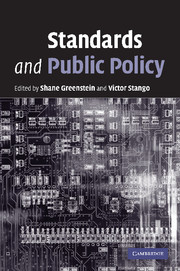Book contents
- Frontmatter
- Contents
- List of figures
- List of tables
- List of contributors
- Introduction
- 1 Standard setting in markets: the browser war
- 2 Competition through institutional form: the case of cluster tool standards
- 3 The economic realities of open standards: black, white, and many shades of gray
- 4 Coordination costs and standard setting: lessons from 56K modems
- 5 Promoting e-business through vertical IS standards: lessons from the US home mortgage industry
- 6 Intellectual property and standardization committee participation in the US modem industry
- 7 Manipulating interface standards as an anticompetitive strategy
- 8 Delay and de jure standardization: exploring the slowdown in Internet standards development
- 9 Standardization: a failing paradigm
- 10 Standards battles and public policy
- 11 Switching to digital television: business and public policy issues
- 12 Should competition policy favor compatibility?
- Index
- References
9 - Standardization: a failing paradigm
Published online by Cambridge University Press: 22 September 2009
- Frontmatter
- Contents
- List of figures
- List of tables
- List of contributors
- Introduction
- 1 Standard setting in markets: the browser war
- 2 Competition through institutional form: the case of cluster tool standards
- 3 The economic realities of open standards: black, white, and many shades of gray
- 4 Coordination costs and standard setting: lessons from 56K modems
- 5 Promoting e-business through vertical IS standards: lessons from the US home mortgage industry
- 6 Intellectual property and standardization committee participation in the US modem industry
- 7 Manipulating interface standards as an anticompetitive strategy
- 8 Delay and de jure standardization: exploring the slowdown in Internet standards development
- 9 Standardization: a failing paradigm
- 10 Standards battles and public policy
- 11 Switching to digital television: business and public policy issues
- 12 Should competition policy favor compatibility?
- Index
- References
Summary
Abstract
Standards, like the poor, have always been with us.
Also, like the poor, there have been well-intentioned attempts to create programs that will make them whole (or at least better). The authors present a proposal for one of these programs on the basis of the beliefs that (1) standardization is failing to serve the interests of the sponsoring organizations, the public, the industry, and the nation and (2) the failure of standardization (as a useful management tool) will have complex and far-reaching consequences for all of the participants. The authors primarily consider voluntary standards, namely, standards that do not have regulatory standing. They focus on and draw their sources from the Information and Communications Technology (ICT) industry. Their article is based on experiential data gained from constant and substantial activity within the standard setting organizations of the ICT industry. Both authors have extensive experience as embedded, empowered, and occasionally neutral (and, for at least one author, bitter) participants in ICT standardization.
Introduction
Standardization is basically a management technique used to reduce risk and, since 1980, it has moved from being viewed as a technical discipline to being viewed as a “cool” marketing tool within the Information and Communication Technology (ICT) industry. This statement is probably an overly dramatic assertion of what has happened in the market, but we believe that it is generally defensible given our perspective of the events over the past twenty-five years.
- Type
- Chapter
- Information
- Standards and Public Policy , pp. 296 - 328Publisher: Cambridge University PressPrint publication year: 2006
References
- 5
- Cited by



